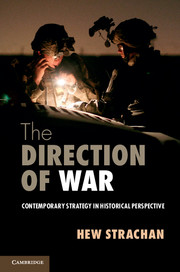Book contents
- Frontmatter
- Contents
- Acknowledgements
- Introduction
- 1 War and strategy at the beginning of the twenty-first century
- 2 The meaning of strategy: historical perspectives
- 3 The case for Clausewitz: reading On war today
- 4 Making strategy work: civil–military relations in Britain and the United States
- 5 Strategy and the limitation of war
- 6 European armies and limited war
- 7 The limitations of strategic culture:the case of the British way in warfare
- 8 Maritime strategy and national policy
- 9 Technology and strategy
- 10 War is war: imperial legacies and current conflicts
- 11 Strategy and the operational level of war
- 12 Strategy and contingency
- 13 Strategy: change and continuity
- Notes
- Index
Introduction
Published online by Cambridge University Press: 05 June 2014
- Frontmatter
- Contents
- Acknowledgements
- Introduction
- 1 War and strategy at the beginning of the twenty-first century
- 2 The meaning of strategy: historical perspectives
- 3 The case for Clausewitz: reading On war today
- 4 Making strategy work: civil–military relations in Britain and the United States
- 5 Strategy and the limitation of war
- 6 European armies and limited war
- 7 The limitations of strategic culture:the case of the British way in warfare
- 8 Maritime strategy and national policy
- 9 Technology and strategy
- 10 War is war: imperial legacies and current conflicts
- 11 Strategy and the operational level of war
- 12 Strategy and contingency
- 13 Strategy: change and continuity
- Notes
- Index
Summary
Many world events, however much they are dwelt on by the media, have no direct effects on us as individuals. Watching television, we see the lives of others thrown into chaos, while our own continue their even tenor. However, very occasionally something occurs which is both shocking in its own right and also personally destabilising. Of such (very rare) occasions, we recall where we were, what we were doing and how we heard the news. Those who were alive when the First World War broke out nearly always recalled the event not just in terms of its global significance but also in its personal context. City-dwellers were on the streets, in a café or buying the latest edition of a newspaper; peasants working in the fields were surprised when they heard the church bell ringing for no obvious reason.
In our own era, the attacks on the United States on 11 September 2001 provoke similar conflations of the massive with the microscopic: they too were one of those defining moments in world history which we understand not just in international terms but also in personal. Each of us tends to recall the circumstances in which we first saw the television images of the jets crashing into the Twin Towers of the World Trade Center. Unlike the beginning of the First World War, the events in New York – and to a lesser extent in Washington – had an immediate global audience. They were communicated with images in real time, not in words after a lapse of time. They reached an audience so stunned that at first it suspended belief, unsure whether it was watching fact or fiction. Those who were stopped in the street by the screens in television shop windows or who were alerted by their friends to turn on their radios were more than observers; they also became participants. It was precisely the attacks’ capacity to acquire a global audience within minutes of their initiation that gave them their strategic effect. Each of us who recalls the circumstances in which we first heard and saw the news is to some extent an involuntary partner in terrorism.
- Type
- Chapter
- Information
- The Direction of WarContemporary Strategy in Historical Perspective, pp. 1 - 9Publisher: Cambridge University PressPrint publication year: 2013



